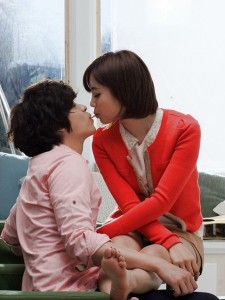 K-pop, like all forms of music, is a great place to escape and tune out the doldrums of the real world, by becoming completely ensconced in eye candy, fast beats, and catchy hooks. However, behind all the fun and games, the songs and MVs of idol groups can have problematic messages embedded in its lyrics and storylines.
K-pop, like all forms of music, is a great place to escape and tune out the doldrums of the real world, by becoming completely ensconced in eye candy, fast beats, and catchy hooks. However, behind all the fun and games, the songs and MVs of idol groups can have problematic messages embedded in its lyrics and storylines.
The majority of, if not all, K-pop songs are about the many facets of love and relationships, and their MVs are usually centred around the trials and tribulations of a girl or boy in love, or out of love, with their future, current, or past signficant other. Many of these MVs portray relationships and love in general in an exaggerated and sometimes, grossly distorted way. The messages found in the songs and MVs are sometimes shocking and offensive, which is worrisome because they are being readily consumed by a young audience. Many of these songs and MVs that I will discuss shortly, have been banned because of the violent material they carry or sexual content, but the ones that weren?t, due to a lack of violence or sexual content, are just as deeply problematic. What?s also worrying is that these messages are not specific to a single group, or entertainment company roster, and can be found throughout the industry and its groups. The repetition of these messages create problematic tropes that can be easily found in a plethora of K-pop songs, and they are usually songs that become very popular, which only abets their prevalence.
It seems that in most MVs, love isn?t depicted as being a part of life, but it is something that sucks the life right out of us and our lives completely revolve around it.? We have idols in MVs being completely passive within life and are completely immersed in their relationship, practically 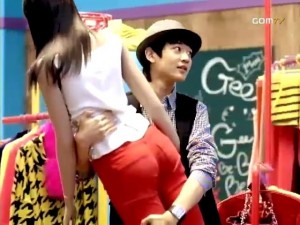 exchanging their own distinct life for the one who is supposedly your true love. This trope is pushed further by even promoting that by having your life completely revolve around him or her, and try to make his or her life with you completely worry and trouble-free.? This is a common premise in most girl group MVs, with ?Hug Me Once? by Girl?s Day and SNSD?s ?Genie? being noteworthy examples, and reiterates misogynistic stereotypes that men should be the dominant ones in a heterosexual relationship, one that should completely revolve around him, with his female counterpart having to dote upon and try to help him in any way she can. Once their relationship dissolves, the girl is usually found moping around her room, bemoaning her loss, and doesn?t seem to pick herself back up again, and there isn?t anything at the end of the MVs that alludes to that. We do have MVs showing boy groups sitting around in their misery, but there aren?t any MVs that show men clinging on to women, having their lives revolve around them, or singing songs about making every wish of his girlfriend or wife come true.
exchanging their own distinct life for the one who is supposedly your true love. This trope is pushed further by even promoting that by having your life completely revolve around him or her, and try to make his or her life with you completely worry and trouble-free.? This is a common premise in most girl group MVs, with ?Hug Me Once? by Girl?s Day and SNSD?s ?Genie? being noteworthy examples, and reiterates misogynistic stereotypes that men should be the dominant ones in a heterosexual relationship, one that should completely revolve around him, with his female counterpart having to dote upon and try to help him in any way she can. Once their relationship dissolves, the girl is usually found moping around her room, bemoaning her loss, and doesn?t seem to pick herself back up again, and there isn?t anything at the end of the MVs that alludes to that. We do have MVs showing boy groups sitting around in their misery, but there aren?t any MVs that show men clinging on to women, having their lives revolve around them, or singing songs about making every wish of his girlfriend or wife come true.
Another aspect of this male-centred relationship is that during the beginnings of their relationships, girls are always the ones who are completely uncertain and shy about love. Rarely do we find boy groups singing and acting in MVs where they are struggling at confessing, the only exception being boy groups who are considered ?flower boys,? boys who are effeminate, meaning they look and act in ways that are commonly associated with women, or at least, how women should look and act. But generally boy groups are portrayed as the more experienced, ?older? ones in the relationships, and can find themselves playing the stereotypical ?bad boy? or? ?player? role. Some MVs, and songs, go even as far as to imply that men should not be sensitive or timid in terms of relationships, and should be more active and act confident. Girl groups even find themselves perpetuating this trope, like Secret?s ?Shy Boy? and 2NE1?s ?Pretty Boy.?
ones who are completely uncertain and shy about love. Rarely do we find boy groups singing and acting in MVs where they are struggling at confessing, the only exception being boy groups who are considered ?flower boys,? boys who are effeminate, meaning they look and act in ways that are commonly associated with women, or at least, how women should look and act. But generally boy groups are portrayed as the more experienced, ?older? ones in the relationships, and can find themselves playing the stereotypical ?bad boy? or? ?player? role. Some MVs, and songs, go even as far as to imply that men should not be sensitive or timid in terms of relationships, and should be more active and act confident. Girl groups even find themselves perpetuating this trope, like Secret?s ?Shy Boy? and 2NE1?s ?Pretty Boy.?
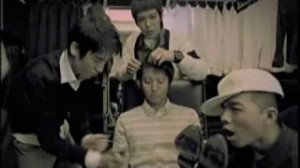
There are also many MVs that imply that the only way to be desirable is by? your appearance alone. For boys, there are many geek turned chic MVs, like Big Bang?s ?Last Farewell? and Super Junior-M?s ?Super Girl,? telling boys that the way to a girl?s heart is by adopting this tough guy appearance, which usually means that they should wear expensive-looking clothes and upgrade from regular glasses to sunglasses.
The latter two examples don?t even show the girls accepting the boys for who they truly are, but only their superficial alter egos. It can go both ways for women as well, with MVs telling girls that appearance is key, and confidence lies in how one looks. In 2NE1?s ?I Am The Best,? although it?s a song about confidence, like many 2NE1 songs, the only reasoning the girls use to support their belief in them being ?the best,? is their appearances. In the MV for Lee Hyori?s ?U Go Girl,? although the lyrics are about confidence as well, the MV is all about how Lee Hyori, or rather the girl she is playing, can get the man of her dreams by changing the way she looks. Most lyrics of songs about boys being in love with girls list the things the boy(s) like about the girl(s) they are singing about, 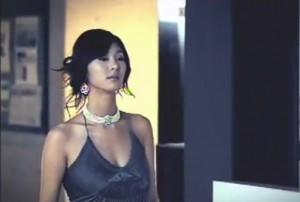 a list that centres around how the girl looks, in a objectified way. They look at various aspects of the girl, her legs, her eyes, her smile, and don?t see the girl as a whole and sentient being. Songs like 2PM?s ?10 out of 10,?? just shows to girls that the only source of her beauty is through her features, not how she is as a person. The emphasis on appearance may be the result of an extremely appearance-conscious culture, but this still does not excuse the message that both young men and women will never be good enough, or desirable, unless they look like this or that, which only lowers their self-esteem and self-worth.
a list that centres around how the girl looks, in a objectified way. They look at various aspects of the girl, her legs, her eyes, her smile, and don?t see the girl as a whole and sentient being. Songs like 2PM?s ?10 out of 10,?? just shows to girls that the only source of her beauty is through her features, not how she is as a person. The emphasis on appearance may be the result of an extremely appearance-conscious culture, but this still does not excuse the message that both young men and women will never be good enough, or desirable, unless they look like this or that, which only lowers their self-esteem and self-worth.
Finally, there are MVs and songs show the darker side of relationships, the possessive and abusive side, but in a completely trivial and romanticized way. Somehow, being completely possessive, and aggressively so, towards one?s significant other managed to become attractive within the mainstream, especially when men act that way towards women. It?s been popularized by books like Twilight, and deeply frightening that teens are taking this messages to heart and associating them with love, when it is not love at all, not even the least bit. Songs like DBSK?s ?Mirotic? toy with this message, which can be blatantly found with such charming lyrics such as:
What is love? What! It?s now meant by the Red Ocean
I?m breakin? my rules again, you know it?s getting boring
Even if you?re hurt a bit, it?s okay Oh~
and the chorus
You want me, You?ve fallen for me, You?re crazy over me
You?re my slave, I got you under my skin
The song even begs the question, ?Is this love?,? and? I honestly tell you DBSK, and Cassies, no it is NOT. If you take away the fact that DBSK is singing this song, the lyrics seem like they are the musings of? a delusional stalker or abusive significant other. Although the song was bought by SM, and Yoo Young-jin only helped with its composition, the fact that they still released the song with its lyrics is still mind-boggling. Even though they were forced to change ?skin? to ?sky,? the creepy message still remains, just with a confusing lyric at the end of the chorus.
The MV of ?Mirotic? makes it seem like DBSK is the one being dominated by this faceless woman, but when accompanied with the lyrics, and placing DBSK in the singing position, the interpretation of the MV could be altered to the faceless woman trying to push DBSK away from her and DBSK trying to dominate over her. Either way, relationships shouldn?t be where one partner has the the upper hand of the other, or having someone ?wear the pants? in the relationship. It should be about mutual respect, and lyrics like in ?Mirotic? are just promoting terrible messages to fans, that are somewhat willing to accept these kinds of lyrics out of some devotion towards their idols, which is saddening.
The next stage in this trope is when the possessive partner becomes violent. MVs with these storylines have very little context as to why this violence is occurring, and sometimes the explanations for the violence are petty and completely random. MVs for
MBLAQ?s ?Y? and
Song Ji-eun and
Bang Yong Guk?s ?Going Crazy?
trivializes violence, making it seem like it?s an act of love or passion, when it?s really just a moment of sheer psychosis and mental breakdown. There is nothing wrong with using a mentally unstable person in a MV, provided it is done in a meaningful and logical manner, not nonchalantly and with absolutely no motivation except for a warped version of love, which MVs like these don?t show it as. It?s something that seems to be taken lightly by entertainment companies and these MVs don?t really provide any context as to telling that?

the ones committing the violence are in the wrong, especially in MBLAQ?s ?Y,? it goes by quickly and suddenly, without a word, or any repercussions, except for maybe crying over what they had done, furthering the belief that they truly love this person.
Like in all developed countries, domestic violence is a huge problem that often goes unaddressed and unreported in South Korea and is more likely to be brushed off as being just a lover?s quarrel, a mindset derived from the cultural stigma against involving oneself into the private lives of another. That is why when MVs, like Tablo?s ?Bad? and Bang Yong Guk?s ?I Remember?? have the nerve to present domestic violence in a trivial, and even romanticized way, it furthers the misconception that domestic violence isn?t that big of a deal. Tablo?s lyrics??love is so bad??accompanying with violence the male is committing against the woman is utterly offensive; the abuse this woman goes through is not love, it?s a man trying to dominate and abuse his wife or girlfriend. What?s even more disturbing is the final scene of the MV, where the two end up huddled together in an embrace, which just reiterates the ?lover?s quarrel? misconception over domestic violence.
In Bang Yong Guk?s ?I Remember,? during the opening scenes, the man suddenly begins to beat his wife or girlfriend, before, just as quickly, the two fall lovingly in each other arms. On both counts, the violence isn?t addressed at all, and in Tablo?s ?Bad,? it?s used in a symbolic and hyper-sexualized way. Even though younger viewers were prevented from watching these MVs, no one, even if you are of age, should be watching them at all. Domestic violence is something that to be taken seriously and should be shown for what it is, a traumatizing and horrifying experience, that has been shown in Korean movies like
Punch Lady, and perhaps even promote and support the limited resources available for people who are abused by their signficant others by maybe including into an MV. Just a thought.
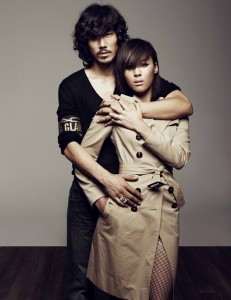 Although there are many MVs and songs that have accurate representations of relationships are and should be like, the lingering existence of these misrepresentations of love and relationships negates any effort a MV does to give an realistic take on love and relationships. What?s even more unsettling is how these MVs and songs managed to be become popular despite the messages they blatantly portray, but what?s even more unsettling is that these people behind all these songs and MVs?who are almost all middle-aged men?have the power to present to fans, who are mostly made up of teens and young adults, healthy relationships and handle the darker aspects of relationships in a thoughtful and appropriate manner, not randomly or carelessly. The constant use of these aforementioned tropes only reinforcing terrible messages and harmful ideals towards impressionable demographics , especially when idols are considered as role models.
Although there are many MVs and songs that have accurate representations of relationships are and should be like, the lingering existence of these misrepresentations of love and relationships negates any effort a MV does to give an realistic take on love and relationships. What?s even more unsettling is how these MVs and songs managed to be become popular despite the messages they blatantly portray, but what?s even more unsettling is that these people behind all these songs and MVs?who are almost all middle-aged men?have the power to present to fans, who are mostly made up of teens and young adults, healthy relationships and handle the darker aspects of relationships in a thoughtful and appropriate manner, not randomly or carelessly. The constant use of these aforementioned tropes only reinforcing terrible messages and harmful ideals towards impressionable demographics , especially when idols are considered as role models.
All of the songs I listed are extremely catchy and nice-sounding, many of them were are personal favourites of mine, in terms of musical quality, but I cannot deny that messages the songs and MVs are not helping matters, and even encouraging obsessive and destructive behaviour because of the nonchalant way these real-life issues are handled. This is not acceptable and should stop immediately, and will only happen if entertainment companies and us fans acknowledge these problematic messages and show love and relationships for what they truly are, and reinforce that love is a part of our lives and real love is about having a healthy relationship made of mutual respect and caring for one another.
So Seoulmates, what MVs and songs have you watched and listened to that showed misrepresentations of love and relationships, or even songs and MVs with great representations? Share them in the comments below!
(minsarang, The Korean Herald, The Grand Narrative, SM Entertainment, LoveKpopSubs )
Related Posts
asu football asu football arkansas lsu storage wars storage wars millionaire matchmaker millionaire matchmaker

 That?s where income properties come in. As inflation goes up, guess what else goes up? Rents. And that makes income producing properties a safe haven investment right now and a great hedge against inflation.
That?s where income properties come in. As inflation goes up, guess what else goes up? Rents. And that makes income producing properties a safe haven investment right now and a great hedge against inflation.

 K-pop, like all forms of music, is a great place to escape and tune out the doldrums of the real world, by becoming completely ensconced in eye candy, fast beats, and catchy hooks. However, behind all the fun and games, the songs and MVs of idol groups can have problematic messages embedded in its lyrics and storylines.
K-pop, like all forms of music, is a great place to escape and tune out the doldrums of the real world, by becoming completely ensconced in eye candy, fast beats, and catchy hooks. However, behind all the fun and games, the songs and MVs of idol groups can have problematic messages embedded in its lyrics and storylines. exchanging their own distinct life for the one who is supposedly your true love. This trope is pushed further by even promoting that by having your life completely revolve around him or her, and try to make his or her life with you completely worry and trouble-free.? This is a common premise in most girl group MVs, with ?Hug Me Once? by Girl?s Day and SNSD?s ?Genie? being noteworthy examples, and reiterates misogynistic stereotypes that men should be the dominant ones in a heterosexual relationship, one that should completely revolve around him, with his female counterpart having to dote upon and try to help him in any way she can. Once their relationship dissolves, the girl is usually found moping around her room, bemoaning her loss, and doesn?t seem to pick herself back up again, and there isn?t anything at the end of the MVs that alludes to that. We do have MVs showing boy groups sitting around in their misery, but there aren?t any MVs that show men clinging on to women, having their lives revolve around them, or singing songs about making every wish of his girlfriend or wife come true.
exchanging their own distinct life for the one who is supposedly your true love. This trope is pushed further by even promoting that by having your life completely revolve around him or her, and try to make his or her life with you completely worry and trouble-free.? This is a common premise in most girl group MVs, with ?Hug Me Once? by Girl?s Day and SNSD?s ?Genie? being noteworthy examples, and reiterates misogynistic stereotypes that men should be the dominant ones in a heterosexual relationship, one that should completely revolve around him, with his female counterpart having to dote upon and try to help him in any way she can. Once their relationship dissolves, the girl is usually found moping around her room, bemoaning her loss, and doesn?t seem to pick herself back up again, and there isn?t anything at the end of the MVs that alludes to that. We do have MVs showing boy groups sitting around in their misery, but there aren?t any MVs that show men clinging on to women, having their lives revolve around them, or singing songs about making every wish of his girlfriend or wife come true. ones who are completely uncertain and shy about love. Rarely do we find boy groups singing and acting in MVs where they are struggling at confessing, the only exception being boy groups who are considered ?flower boys,? boys who are effeminate, meaning they look and act in ways that are commonly associated with women, or at least, how women should look and act. But generally boy groups are portrayed as the more experienced, ?older? ones in the relationships, and can find themselves playing the stereotypical ?bad boy? or? ?player? role. Some MVs, and songs, go even as far as to imply that men should not be sensitive or timid in terms of relationships, and should be more active and act confident. Girl groups even find themselves perpetuating this trope, like Secret?s ?Shy Boy? and 2NE1?s ?Pretty Boy.?
ones who are completely uncertain and shy about love. Rarely do we find boy groups singing and acting in MVs where they are struggling at confessing, the only exception being boy groups who are considered ?flower boys,? boys who are effeminate, meaning they look and act in ways that are commonly associated with women, or at least, how women should look and act. But generally boy groups are portrayed as the more experienced, ?older? ones in the relationships, and can find themselves playing the stereotypical ?bad boy? or? ?player? role. Some MVs, and songs, go even as far as to imply that men should not be sensitive or timid in terms of relationships, and should be more active and act confident. Girl groups even find themselves perpetuating this trope, like Secret?s ?Shy Boy? and 2NE1?s ?Pretty Boy.?
 a list that centres around how the girl looks, in a objectified way. They look at various aspects of the girl, her legs, her eyes, her smile, and don?t see the girl as a whole and sentient being. Songs like 2PM?s ?10 out of 10,?? just shows to girls that the only source of her beauty is through her features, not how she is as a person. The emphasis on appearance may be the result of an extremely appearance-conscious culture, but this still does not excuse the message that both young men and women will never be good enough, or desirable, unless they look like this or that, which only lowers their self-esteem and self-worth.
a list that centres around how the girl looks, in a objectified way. They look at various aspects of the girl, her legs, her eyes, her smile, and don?t see the girl as a whole and sentient being. Songs like 2PM?s ?10 out of 10,?? just shows to girls that the only source of her beauty is through her features, not how she is as a person. The emphasis on appearance may be the result of an extremely appearance-conscious culture, but this still does not excuse the message that both young men and women will never be good enough, or desirable, unless they look like this or that, which only lowers their self-esteem and self-worth. the ones committing the violence are in the wrong, especially in MBLAQ?s ?Y,? it goes by quickly and suddenly, without a word, or any repercussions, except for maybe crying over what they had done, furthering the belief that they truly love this person.
the ones committing the violence are in the wrong, especially in MBLAQ?s ?Y,? it goes by quickly and suddenly, without a word, or any repercussions, except for maybe crying over what they had done, furthering the belief that they truly love this person. Although there are many MVs and songs that have accurate representations of relationships are and should be like, the lingering existence of these misrepresentations of love and relationships negates any effort a MV does to give an realistic take on love and relationships. What?s even more unsettling is how these MVs and songs managed to be become popular despite the messages they blatantly portray, but what?s even more unsettling is that these people behind all these songs and MVs?who are almost all middle-aged men?have the power to present to fans, who are mostly made up of teens and young adults, healthy relationships and handle the darker aspects of relationships in a thoughtful and appropriate manner, not randomly or carelessly. The constant use of these aforementioned tropes only reinforcing terrible messages and harmful ideals towards impressionable demographics , especially when idols are considered as role models.
Although there are many MVs and songs that have accurate representations of relationships are and should be like, the lingering existence of these misrepresentations of love and relationships negates any effort a MV does to give an realistic take on love and relationships. What?s even more unsettling is how these MVs and songs managed to be become popular despite the messages they blatantly portray, but what?s even more unsettling is that these people behind all these songs and MVs?who are almost all middle-aged men?have the power to present to fans, who are mostly made up of teens and young adults, healthy relationships and handle the darker aspects of relationships in a thoughtful and appropriate manner, not randomly or carelessly. The constant use of these aforementioned tropes only reinforcing terrible messages and harmful ideals towards impressionable demographics , especially when idols are considered as role models.



